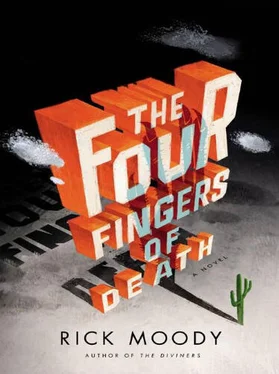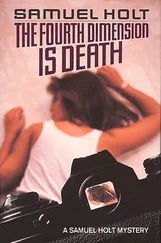I wrote these lines about George in the molded plastic chairs in the hospital waiting room. I gazed abstractedly at the scorched, nonnative palms out in front, which had died or were about to die owing to the seventh year of our regional drought. I had brought with me a little personal digital assistant of the sort I’m sure you know (I was unwilling to have mine surgically implanted, though the wife sure loved hers), and I scribbled, metaphorically speaking, my surmises about George, my wife’s donor.
Let us now move on to George, the tertiary phase. Among the other activities of George during his later teens was the disassembly and reassembly of an antique motorcycle (1968), which his otherwise childless parents purchased for him after much hand-wringing. They fervently wished that George would not ride the motorcycle in question, because of his eccentric habits and attitudes about so many things. Also because fuel shortages made this kind of transport frivolous. This injunction against riding the motorcycle was, for a time, acceptable to George. George was more interested in reassembly. He laid out the pieces of the motorcycle in certain patterns and shapes.
There would be no way to write about George, and in this way to occupy many hours spent in the waiting rooms of the hospital, without writing about the fateful night that ended George’s term here on earth. Upon reassembling the motorcycle for the third time, George frivolously decided that the prohibition against riding it no longer made good sense. Some three years had passed during which he had contented himself with the reassembling, years of washing the motorcycle until its shine reflected his face and the stubble upon it, years of starting the bike only in order to make sure that it sounded right, that the timing was good — all this per the instructions of George’s motorcycle guru, a man up the block named Laramie. Overcome by the whim of precipitous maturation, George decided one night to take his motorcycle for a spin in the hills above town. Laramie, an erratic and underemployed person, confirmed the wisdom of this idea.
It was a night featuring a stunning sunset, and I say this mindful of the fact that sunsets in this part of the world are often overpowering. The flyboys from the regional air force base were out in the evening sky in profusion, protecting us from an ill-defined enemy. It hadn’t rained for 213 days, and there were dust storms. A comet was due to emerge in the southern sky, and it would have been an agreeable thing to witness this comet, especially in the mountain pass west of town. And yet Monaco 37, the comet, didn’t seem to have been a factor in George’s untimely demise. The sunset was a factor, however. To George, locked in the constraints of a misunderstood brain disorder, history unfolded erratically, and anew. Every day was a day of import. Congress was meeting again tomorrow, there was the restocking of the depleted shelves in our supermarket price clubs, the collection and densifying of refuse in municipal garbage trucks, the ritualized busing of homeless persons to the camps by the border.
And so the young man whose lungs would soon rest in my wife’s chest cavity kicked up the kickstand of his reassembled motorcycle. He throttled his throttle. He headed up into the northerly hills without giving much thought to his destination nor to returning expeditiously so as not to alarm his working parents. Then came his fervent apperception of the sunset. On the pavement, he followed the perfect crimson light of the magic hour, when the sun dipped behind the western peaks, when these peaks were bathed in pomegranate quanta. He followed the sunset intuitively, without questioning it, looking for its sweet spot, from which best to contemplate. I wish I could say now that George’s death was not his fault, that there was a runaway semi, a teamster who had simply worked too many shifts in a row, or maybe there was a reintroduced wolf loitering on the tarmac. It was not so. The southwestern sunset did George in. Apparently, George, unlicensed and unable to control his motorcycle, failed to operate the bike on one of our myriad regional hairpins, and despite his promise and his triumph over adversity, George sailed out over the embankment, becoming almost instantly a white plastic cross with artificial flowers and a love letter from his mom.
As I say, I wrote many pages about George. And I waited. When I cut down all the reams of eulogistic ramblings about George, when I eliminated anything that was excessively sentimental, that described too accurately the look on the faces of George’s parents when I called on them, that utterly dignified but devastated Hispanic couple — what remained was the sentence:
He was just a kid.
A scant two hours after George’s demise, my wife was contacted by the international organ lottery, and we were told to report immediately to the university medical center. Preparations for leaving the house took some time because my wife was down to 15 or 20 percent of lung function. She was scared, if resigned, and kept saying “Monty, I just don’t want to die on the table.” I could barely understand her through the oxygen mask. “Monty, if I die, who is going to harass you?” To which I would say, “Nobody is dying.” I put her in a wheelchair that I used when we were making longish trips, and I wheeled her out into the driveway, and I went next door to ask the neighbors, the Rodriguezes, if we could borrow their car or if they could otherwise give us a ride, because we didn’t have a car. This had been a long-standing arrangement between myself and Mike Rodriguez, namely, that a day would come when we would be called to the hospital. On this day, there would be no time to waste. I’d told Mike all of this, fumbling, shifting from foot to foot. Could we rely on him? I’d made the same arrangement with the other neighbors, on the other side, until, as with so many houses on the block, the for sale signs went up in front of the unit. And never came down.
The Rodriguez family was not answering the bell. I thought I’d stressed to Mike the importance of his letting me know if and when he was traveling. I shouted to Tara, out in the driveway, “Should I call a cab?” As you know, most of the taxi companies had been priced out of the market by the extremely high cost of corn-and-petroleum-blended fuel products. And the taxis had not exactly been replaced by a reliable system of mass transit. Unless you count walking. There was a lot of walking going on. A lot of balancing things on the head. Tara wheezed, “The Rodriguezes will be back soon.” Tara said this because there were five grown Rodriguez children, all living at home. They each drove occasionally. Rather too fast, if you asked me. Nevertheless, I said to my wife, “Are you frigging crazy? We have to get you up to the hospital and into the operating room.” This was when, despite my urgency, I realized exactly how scared my wife, Tara, was. She was scared enough that she would rather die in the driveway of heatstroke than go through with the operation.
Which was why I had to yell. I don’t like yelling. In fact, Tara and I had an arrangement where no yelling would take place, ever , which was counterproductive, at least according to an online course on marital communication I had once taken, entitled “The Healthiest Relationship: Ten Preliminary Steps,” by Deep Singh, PhD. (1) Assess what works for you. (2) Accept your shortcomings. (3) Practice tolerance and understanding . I can’t remember the other seven steps. But let us not dwell here. I also need to reconstruct for you now what was already happening in the hospital — the sequence of events in which poor George was being harvested of all his usable bits.
I don’t know the biographies of all the recipients the way I know the biography of George. And yet I can tell you a few things: his corneas passed on to a septuagenarian in Pasadena, his liver went to a baritone of the popular-music world whose hepatitis C had compromised the liver he was born with, and George’s heart went to a retiree in the northern part of our state, a former autoworker. These heroic stories fork off from the story of my wife, Tara, each taking place on the same day, with similar drama. Be at such and such a medical facility at such and such a time. There were worried people like me in waiting rooms all over the southwestern part of the nation. We constituted a community of worriers, all of us with fingernails chewed to the quick, with shooting pains in the lower intestines, red eyes, unwashed hair, caffeine breath.
Читать дальше












